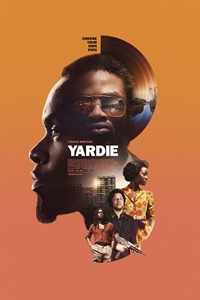Yardie () ★★½
 For his directorial debut, Idris Elba has elected to work in a genre he's comfortable with - the crime thriller. The actor-turned-director is not, however, content merely to regurgitate bits and pieces of productions in which he has appeared in front of the camera. By incorporating a strong Jamaican flavor and infusing the mix with reggae and dance, Elba provides something more interesting than the standard tale of gang warfare and drug deals that forms Yardie's skeleton. However, although these unique elements form an effective distraction, their ability to captivate wears thin, exposing the threadbare, overfamiliar story that struggles mightily to keep viewers engaged.
For his directorial debut, Idris Elba has elected to work in a genre he's comfortable with - the crime thriller. The actor-turned-director is not, however, content merely to regurgitate bits and pieces of productions in which he has appeared in front of the camera. By incorporating a strong Jamaican flavor and infusing the mix with reggae and dance, Elba provides something more interesting than the standard tale of gang warfare and drug deals that forms Yardie's skeleton. However, although these unique elements form an effective distraction, their ability to captivate wears thin, exposing the threadbare, overfamiliar story that struggles mightily to keep viewers engaged.
According to Wikipedia, the term "yardie" is used "to refer to persons of Jamaican origin," which accurately describes the film's main character. The screenplay, credited to Brock Norman Brock and Martin Stellman, uses as its source the 1992 cult classic by Jamaican-British novelist Victor Headley.
Beginning with an extended prologue set in 1977 Kingston, the film focuses on Dennis Campbell, or "D" (Antwayne Eccleston), a teenager who becomes caught in the cross-hairs of a local gang war. After his beloved older brother, Jerry Dread (Everaldo Creary), is gunned down, D's guardianship falls to crime lord King Fox (Sheldon Shepherd), who grooms him as an operative. Skipping ahead about a decade, King Fox, looking to expand his empire to include drug exports, sends D (now played by Aml Ameen) to London to close a deal with Rico (Stephen Graham). D has an ulterior motive for making the trip - his ex-girlfriend, Yvonne (Shantol Jackson), lives there with their young daughter, whom he hasn't seen since she was a baby. Things don't go well in the meeting with Rico and D is forced to go on the run. He is pursued not only by Rico's crew but by a group of rivals. His situation brings danger to Yvonne and he is unable to persuade King Fox that he has things under control. He then learns that the man who killed his brother is in London and the desire for revenge supersedes everything else - including survival.
By setting the film's first half in Jamaica, Elba is able to take advantage of the "local color" provided by the location. This doesn't have a lasting impact insofar as Yardie's overall quality is concerned but it makes a refreshing change from, say, the mean streets of New York. Also, in addition to the drug war, there's a secondary "sound system war" in which opposing gangs battle to see who has the premiere acoustic equipment. This adds an offbeat element to the production, although it isn't used as effectively as it might have been. (It fizzles at the end.) The chances taken by Yardie compensate for the weakness resulting from a derivative story.
Production design, cinematography, and acting are strong. The scenes in Jamaica are bathed in soft oranges, browns, and reds to contrast with the harsher lighting of London's East End dance club scene. Aml Ameen and Shantol Jackson give forceful, lived-in performances. These two inhabit their characters rather than merely playing them. Elba the director relies on Elba the actor to help Ameen show glimpses of the layers and facets that comprise D. Stephen Graham is an outlier in the acting regime; he portrays Rico as a walking, talking cliché.
In the end, we care about D and are invested in his evolution as a character but there's always a sense that we know where things are going and how they're going to end up. That's not just because the narrator is D as an older adult looking back on his life and questioning whether he chose the "righteous path," but because the movie doesn't deviate far from the expected trajectory. The song may be different but the beats are the same.
(Note: Although most of the film is in English, the distributors elected to add subtitles. When the movie was shown at film festivals, some viewers had difficulty understanding the dialogue, which is heavily accented and uses various Jamaican colloquialisms. The determination to subtitle the entire movie removes the difficulty of having to concentrate to decode what's being said. Unfortunately, it creates the dreaded "subtitle barrier" that limits the audience for most foreign language films.)
© 2019 James Berardinelli
To get the full Quicklook Films experience, uncheck "Enable on this Site" from Adblock Plus
box office top 10

Civil War Released: April 12, 2024 Cast: Kirsten Dunst, Wagner Moura 11.1M

Abigail Released: April 19, 2024 Cast: Melissa Barrera, Dan Stevens 10.2M

Godzilla x Kong: The New Empire Released: March 29, 2024 Cast: Rebecca Hall, Brian Tyree Henry 9.5M

The Ministry of Ungentlemanly Warfare Released: April 19, 2024 Cast: Henry Cavill, Eiza Gonzalez 9M

Spy x Family Code: White Released: April 19, 2024 Cast: Takuya Eguchi, Saori Hayami 4.9M

Kung Fu Panda 4 Released: March 8, 2024 Cast: Jack Black, Viola Davis 4.6M

Ghostbusters: Frozen Empire Released: March 22, 2024 Cast: Paul Rudd, Carrie Coon 4.4M

Dune: Part Two Released: March 1, 2024 Cast: Timothée Chalamet, Rebecca Ferguson 2.9M

Monkey Man Released: April 5, 2024 Cast: Dev Patel, Sikandar Kher 2.2M

The First Omen Released: April 5, 2024 Cast: Nell Tiger Free, Bill Nighy 1.7M






